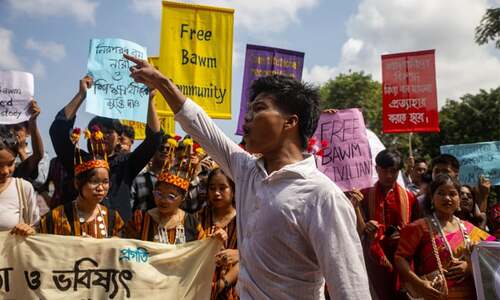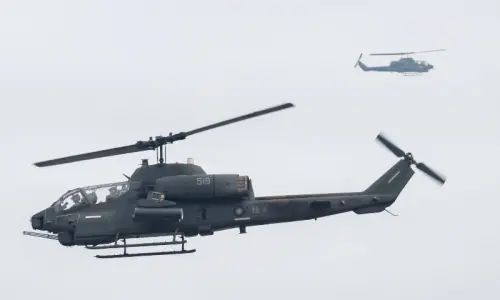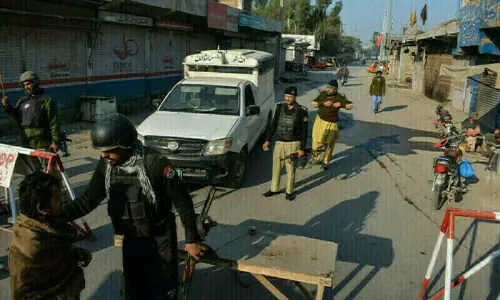SEOUL: The United States started to deploy the first elements of its advanced anti-missile defence system in South Korea on Tuesday after North Korea’s test of four ballistic missiles, US Pacific Command said, despite angry opposition from China.
The announcement came as North Korean state media said leader Kim Jong Un had personally supervised Monday’s missile launches by an army unit that is positioned to strike US bases in Japan, stepping up threats against Washington as US troops conduct joint military exercises with South Korea.
“Continued provocative actions by North Korea, to include yesterday’s launch of multiple missiles, only confirm the prudence of our alliance decision last year to deploy THAAD to South Korea,” US Pacific Commander Admiral Harry Harris said in a statement, referring to the Terminal High Altitude Area Defence (THAAD) anti-missile system.
The move by the US military is likely to deepen the brewing conflict between South Korea and China, which says the THAAD deployment destroys the regional security balance.
The four ballistic missiles fired by North Korea landed in the sea off Japan’s northwest, angering Seoul and Tokyo, days after Pyongyang promised retaliation over the military drills that it sees as preparation for war.
US President Donald Trump and Japanese Prime Minister Shinzo Abe discussed the launches by the nuclear-armed North during a phone call on Tuesday.
“Japan and the US confirmed that the latest North Korean missile launches were clearly against UN resolutions and a clear provocation against the regional and international community,” Abe told reporters.
Trump also spoke to South Korea’s acting President Hwang Kyo-ahn to discuss the North’s missile launches, Hwang’s office said.
Reclusive North Korea, which has carried out a series of nuclear and missile tests in defiance of United Nations resolutions, issued a typically robust statement on state news agency KCNA after the missile launches.
“In the hearts of artillerymen ... there was burning desire to mercilessly retaliate against the warmongers going ahead with their joint war exercises,” KCNA said.
It said Kim ordered the Korean People’s Army’s Strategic Force “to keep highly alert as required by the grim situation in which an actual war may break out any time, and get fully ready to promptly move, take positions and strike so that it can open fire to annihilate the enemies”.
The missiles North Korea fired on Monday were unlikely to have been intercontinental ballistic missiles (ICBMs), South Korea said, which can reach the United States. They flew on average 1,000 km (620 miles) and reached an altitude of 260 km (160 miles).
Some landed as close as 300 km (190 miles) from Japan’s northwest coast, Japan’s defence minister said earlier.
South Korean military and intelligence officials said on Tuesday the four North Korean missiles appeared to be an upgraded version of the Scud type.
North Korea is mired in a separate diplomatic row with Malaysia over the killing of Kim’s estranged half-brother at Kuala Lumpur airport last month.
The two countries have expelled each other’s ambassador from their capitals and on Tuesday announced tit-for-tat bans on departures of each other’s nationals, sharply escalating tensions between two countries that, until the killing of Kim Jong Nam, had maintained rare close ties.
The United States and Japan have requested a United Nations Security Council meeting on the latest North Korean missile launches, which will likely be scheduled for Wednesday, diplomats said.
Published in Dawn, March 8th, 2017



































